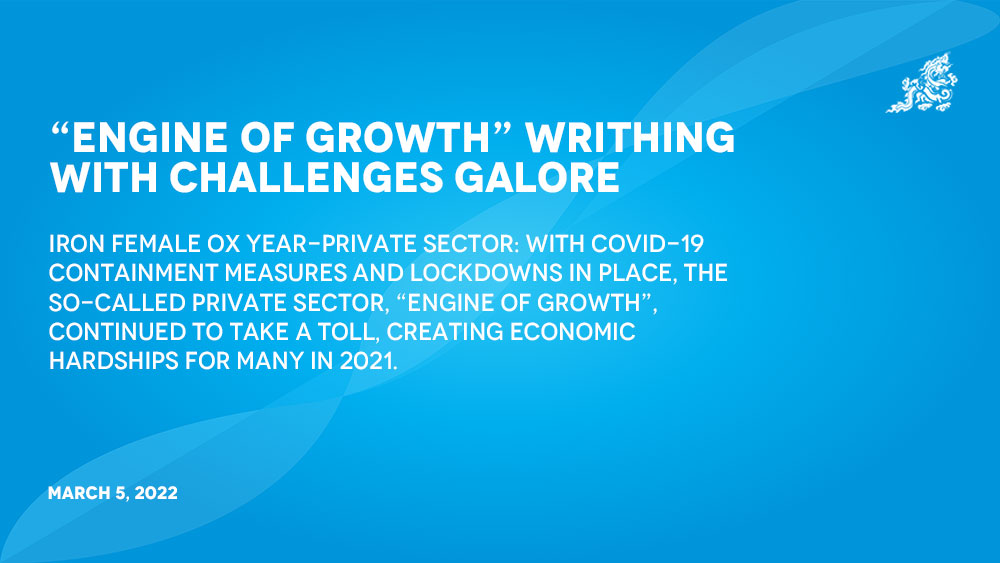Thukten Zangpo
Iron Female Ox Year-Private sector: With Covid-19 containment measures and lockdowns in place, the so-called private sector, “engine of growth”, continued to take a toll, creating economic hardships for many in 2021.
The lockdowns on April 16, 2021, for all thromdes and satellite towns in the southern dzongkhags and the January 16, 2022 lockdown in 14 districts affected everyday life and businesses severely.
Thankfully, to the relief of many who struggled to get by, Druk Gyalpo’s Relief Kidu in the form of income support, interest waivers, and loan deferment until June 2022 greatly lessened the hardships.
The year also saw a global hike in the price of oil and disruptions in the supply chains of goods which increased the price of the goods proportionately. The goods become costlier to the people and businesses by 7.35 percent in 2021 compared to 2020.
The construction sector (which contributed 9.5 percent of GDP in 2020) saw the cost escalation of materials by 100 percent and import of labour by 200 percent.
In addition, with the shortage of 13,000 foreign workers in the country due to limited quarantine facilities, the sector came to a grinding halt. The 400-bed temporary quarantine facility constructed on September 30 was helpful in bringing the workers.
Despite the lockdown, the government had to allow constructions to be carried out in containment mode and even announced a one-time 20 percent special advance to contractors at the year-end as support to the sector.
The government also increased the material mobilisation advance payment to contractors from the existing 10 percent to 20 percent of the contract price on March 23, 2021.
With imports limited to only essential goods in the country, the wholesale and retail trade was also affected. The value of import goods fell by Nu 3 billion in the third quarter of the fiscal year (FY) 2020-2021 compared to the same period in FY 2019-2020.
Retail and wholesale trade contributed 10.5 percent of GDP in 2020 and provided 24.1 percent of employment in the country.
Similarly, the manufacturing sector, accommodation, and food service activities were also affected.
On January 7, 2022, the government ordered the closure of the operation of drayangs. The government announced to compensate Nu 1 million (M) to 1.5M to every drayang owner. Other entertainment centers were closed temporarily due to the higher risk of Covid-19 transmission.
As a measure to support the private sector, the government reduced the tax rate of 10 percent for small, cottage, and micro-businesses located in border towns of Gelephu, Phuentsholing, Samtse, and Samdrupjongkhar for the income year 2021 on January 30, 2022.
Similarly, the government extended the filing of tax returns for the income year 2021 by a month due to the lockdown on February 2, 2022.
The year also saw the introduction of a provident fund scheme for private-sector employees by the National Pension and Provident Fund.
The government asked the real property owners to declare their annual rental income correctly when filing personal income tax for the year 2021 on December 24, 2021.
Importers and exporters, similarly, were asked to refrain from undervaluation, misdeclaration, and non-declaration of the import and export consignments.
According to the Royal Monetary Authority, credit to the private sector fell by almost double to 6.9 percent in 2020-21 compared to 13.3 percent in 2019-2020. However, it is estimated to increase to 10.9 percent in 2021-22.


